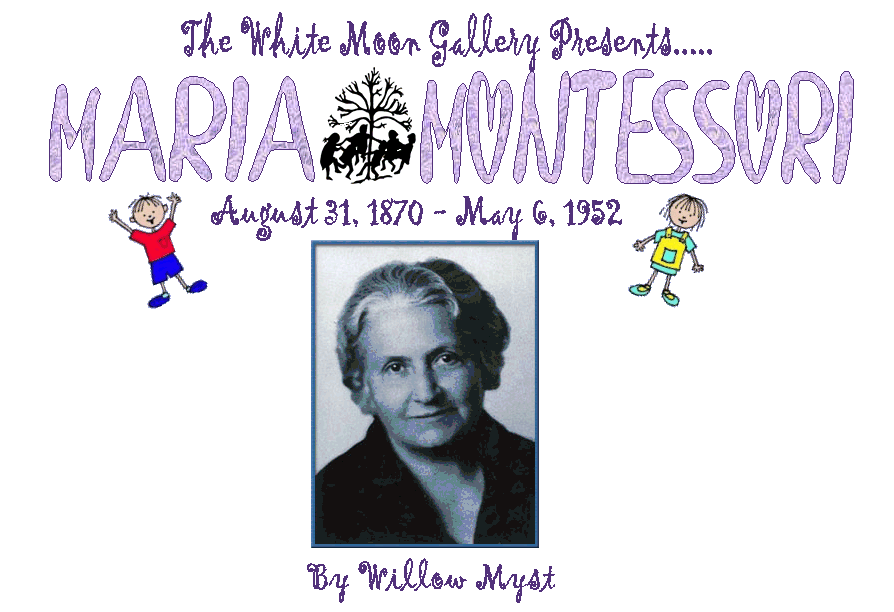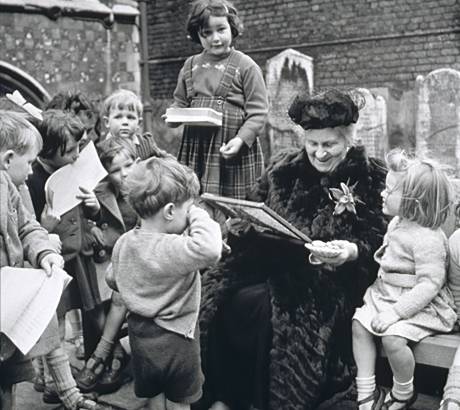|
|
|
|
|
|
|
|
|
|
|
|
|
|
|
|
|
|
|
|
|
|
|
|
 |
|
|
|
|
"Free the child's potential, and you will transform her into the world."
--Maria Montessori
|
|
|
|
|
|
When contemplating a goddess for this project, I knew I wanted to honor a Goddess Among Us. However, I found myself realizing I never thought much about the women that have influenced my life. Until now and through the help of The White Moon, I was unaware of the multitude of amazing women who have made it possible for all of us to have the confidence to pursue our dreams. With this awareness I then realized a truly phenomenal goddess had been right under my nose all the time. And that woman is Maria Montessori.
My experience with Maria Montessori has been a personal one. Not personal in the sense that I actually knew this wonderful woman but personal in the sense that I have experienced first hand what she has accomplished. I am a six-year participant in our local Montessori school currently attended by my four-year-old daughter. Both of my children are Montessori educated and the results are truly amazing! Over the years, I feel I've grown to know who Maria Montessori really is and would love to share her story with you.
"It is not enough for the teacher to love the child. She must first love and understand the universe. She must prepare herself, and truly work at it."
-Maria Montessori
The Life of Maria Montessori
Maria was born August 31, 1870 in Chiaravalle, Italy to Alessandro and Renilde Montessori. As a young girl she found school to be very boring. The girls were schooled separately from the boys. They sat on benches in rows and did needlework and recited the same lessons over and over. At one point she thought she would quit and become an actress. However, she began to show a special interest in mathematics. She wanted to attend technical school, which she thought would please her accountant father. Alessandro was very old fashioned believing this was something women just didn't do and did not agree to this pursuit. Her mother, however, always encouraged Maria's natural self-confidence and determination. She supported her daughter in her decision and at the age of 13 Maria began her studies. She enjoyed learning all the new subjects but the classes were still the same memorizing and reciting from text. Maria was considering becoming an engineer. Her father couldn't understand why she just didn't pursue teaching as a career. That was the last choice she thought she would make and eventually she decided she would become a doctor.
Maria received overwhelming disapproval for this decision. She persisted and was finally accepted as the first woman in Italy to study medicine. It was a tough road for her. Although she earned the respect of her professors, the other students did their best to "keep her in her place". She wasn't allowed to dissect human bodies with the other students because it was not proper for men and women to see a naked body together. So she was forced to dissect alone at night which took all of her willpower. She decided to specialize in pediatrics and also took an interest in psychiatry. At the end of the six years of studies, all students were required to give a lecture to their entire class. Maria was prepared for criticism from all the men but instead received a standing ovation. At the age of 25, Maria Montessori earned her medical degree and became the first woman doctor in Italy.
Maria opened her own clinic as well as working as an assistant doctor at the psychiatric clinic of the University of Rome. Her interests were in treating children. She was particularly drawn to children at the psychiatric clinic who were labeled mentally retarded or emotionally disturbed. The children were kept in rooms with no toys or other objects. Maria began observing these children and felt that she could help them. She believed these children needed to be in special schools and not hospitals. That led her to learn everything she could about the education of young children. During these years of research she worked closely with another doctor Giuseppe Montesano. The two fell in love and Maria had Guiseppe's son. They never married for reasons no one seems to know. It would have been scandalous at the time for Maria to have a child out of wedlock and would have ruined her career. So, she had to send her son away to live with a family in the countryside near Rome. She visited him throughout his childhood and remained in contact but he was never told the truth about his mother until he was grown.
Maria was asked to be the director of a new school opening to train teachers to work with mentally and emotionally challenged children. Maria felt the children would learn best first through using their senses and then their minds. She developed materials for them to use and the children made amazing progress. She took these children to traditional public schools and they were able to pass the tests the "normal" children were taking. This made Maria wonder about the teaching methods of the public schools. Despite the progress she made, she decided to quit this job and take further classes to learn more about how children learn. She continued practicing medicine as well as lecturing and writing articles. In 1906, a group of bankers asked Maria to help them with the children of an apartment complex they had renovated. The people that lived there were poor and could not afford to have someone watch their children while they worked. The bankers agreed to provide a room for the children to stay in during the day in order to keep them from destroying the complex. Maria was anxious to finally test her ideas and opened the first Montessori school know as "Casa dei Bambini" or "Children's House". Maria developed many materials for the children to work with. Then she simply observed them. She was amazed at how they preferred her materials to regular toys. Children as young as 3 and 4 years old were content to sit for lengths of time repeating tasks over and over again. She observed that children learned certain things more easily at certain stages she later defined as "sensitive periods". She designed materials that were "child sized" and that also encouraged independence. She often said "No one can be free unless he is independent." (1) Her unique methods helped children learn to how to read and write at ages much younger than most thought could be taught. She believed the real teachers of the children are the children themselves. Three months after her first school opened, another Montessori school was born. In 1909 Maria decided to put her method to paper and wrote the book "The Montessori Method". Soon schools all over the world were opening. Maria felt it was important to have teachers properly trained and opened the first teacher-training course in 1913. Throughout all her activities, she always stayed close to the children. She visited schools around the world often and the children were always eager to see her and show her what they could do.
|
|
|
|
|
"One test of correctness of educational procedure is the happiness of the child."
--Maria Montessori
|
|
|
|
|
 |
When her son was 15 years old, she finally decided to tell him who she was. He always felt he knew that she was his mother and from that time on they were always together. He worked closely with his mother and together in 1929, they founded the Association Montessori Internationale to oversee the schools and teacher training. It wasn't until her death that she was finally able to publicly call him her son. Maria died in Holland while visiting friends on May 6, 1952. It was her wish to be buried where she died. However there is a stone at her parents grave with the following words written: Maria Montessori "rests far from her beloved country, far from her dear ones buried here, at her wish as testimony to the universality of the work which made her a citizen of the world." (1)
|
|
|
|
|
Photo in title graphic courtesy of Wikipedia |
|
|
|
|
|
|
Photo (left) courtesy of MSN Encarta Premium |
|
|
|
|
"The world of education is like an island where people, cut off from the world, are prepared for life by exclusion from it."
--Maria Montessori
|
|
|
|
|
Her accomplishments:
- Italy's first female doctor
- Represented Italy at two international women's conferences ~ Berlin in 1896 and London in 1900
- She was an outspoken advocate for women's rights
- Showed her glass house classroom at the Panama-Pacific International Exhibition in San Francisco in 1915
- Appointed inspector of schools in Italy in 1922
- Friends with Alexander Graham Bell and Helen Keller
- Wrote over a dozen books ~ Most well know are the Montessori Method (1916) and The Absorbent Mind (1949)
- Nominated for the Nobel Peace Prize in 1949, 1950 and 1951
- Credited with the development of the open classroom, manipulative learning materials and individualized education as well as introducing child-sized furniture in the classroom
- More than 3,000 Montessori schools are now established in the United States alone since 1957
|
|
|
|
|
Because of You
(Dedicated to Maria Montessori)
By Willow Myst
|
|
|
|
|
Because of you, I am inspired.
Because of you, I feel anything is possible.
Because of you, it's OK to be different.
Because of you, I've learned to be persistent.
Because of you, I can find my passion and pursue it unceasingly.
Because of you, my life is my responsibility.
Because of you, learning can be and is fun.
Because of you, I can think outside of the box.
Because of you, I can believe in me.
Because of you, I am proud to be a woman.
Because of you, my children can be who they truly are
And so can I, because of you.
|
|
|
|
|
I can't begin to give Maria's story and her work justice in this brief report. But I do encourage you, if interested, to seek more information from these resources: |
|
|
|
|
|
|
White Moon Gallery
|
|
|
|
|
|
|
|
|
|
Join a School
|
|
|
|
|
|
|
|
Books:
(1)Mammolina, A Story about Maria Montessori. O'Connor, Barbara. 1993. Carolrhoda Books, Inc., Minneapolis, MN. Pg. 44
(2)Maria Montessori, A Biography. Kramer, Rita. 1976. G.P. Putnam's Sons, New York, NY.
(3)The Essential Montessori, An Introduction to the Woman, the Writings, the Method and the Movement. Hainstock, Elizabeth G. 1997, Penguin Books, New York, NY.
Websites:
Montessori Quotes ~ http://womenshistory.about.com/od/quotes/a/montessori_p.htm
About Maria Montessori ~ http://privateschool.about.com/od/montessoriindex/p/Montessori_p.htm
Maria Montessori - http://en.wikipedia.org/wiki/Maria_Montessori
Maria Montessori - http://www.webster.edu/~woolflm/montessori2.html
Maria Montessori ~ A Brief Biography - http://www.montessori-namta.org/NAMTA/geninfo/mmbio.html
Montessori, Maria - http://encarta.msn.com/encyclopedia_761574215/Montessori.html
Teacher Hero, Maria Montessori - http://www.myhero.com/myhero/hero.asp?hero=mariaMontessori
Maria Montessori (1870-1952) - http://www.webster.edu/~woolflm/women.html
|
|

